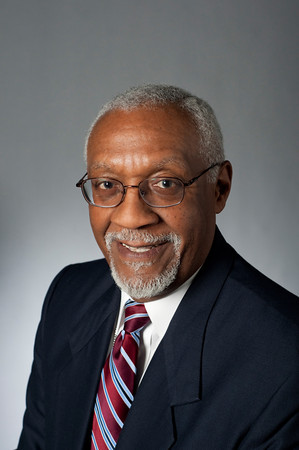U.S. Ambassador and George Mason Professor John M. Jones
 |
| Professor John Jones (photo courtesy of John M. Jones) |
Briefing the president of the United States on national security and traveling with a camel caravan are just some of the experiences that Professor John Jones brings to his students in the Public Policy and MBA programs at George Mason University. As an adjunct faculty member at Mason, he teaches courses for the graduate programs in the schools of management and public policy. Professor Jones was a former U.S. Ambassador to Guyana from 2008 to 2010, and, as a life-long U.S Foreign Service officer, has spent considerable time in Latin America, Southeast Asia, the Middle East, Western Europe and parts of Africa.
Jones graduated from University of Pennsylvania’s Wharton MBA program and Howard University’s law school.He seemed destined for a legal career as he set up his own private practice.
“It was after a couple years as an attorney that I decided to become a Foreign Service officer in 1981,” Jones said.
Conflict resolution was a focus throughout Jones' tenure, beginning in Costa Rica, where he served as a consular officer and was on duty in 1984, during the Iran Contra controversy in Central America.
As a refugee officer in Vietnam, Laos, Cambodia and Thailand as part of the United Nations High Commission to rescue refugees, Jones was responsible for processing the refugees for resettlement in the United States. Jones recalls it was a “gut wrenching experience in Vietnam where the poverty stricken refugees were living in horrible conditions.”
Professor Jones said that one of his most vivid memories from his Foreign Service experience was while he was stationed in Burkina Faso. He spent two weeks with the United Nations Commissioner for Refugees, traveling with a camel caravan through the Sahara Desert.
“This was an effort to monitor the condition of Tuareg refugees who were fleeing from the war in Mali,” Jones said. The experience gave him a new perspective on the region and substantially changed his career path.
“I made up my mind to work for the betterment of people,” Jones said.
Jones described witnessing the cruel nature of war as it impacted the helpless women and children “who were displaced by marauding armed forces intent on killing as many people as possible from different ethnic or tribal groups.”
“People fled from advancing armed groups with only what they could carry on their backs or load onto animals,” Jones said. He remembers the living conditions in the resettlement camps being “abysmal.”
“The death rate among children was hard to fathom,” Jones said.
The local governments in the region were overwhelmed by the massive numbers of refugees and called on the UN, embassies and non-governmental organizations for help.
Later in Jones’ career he served as a senior inspector in the Office of the Inspector General, where he monitored the status of police training in Afghanistan and inspected embassies in Latin America and Europe.
While serving as leader of the Provincial Reconstruction Team in Diyala Province, Iraq, Jones was called to Washington, D.C. and asked to brief the Secretary of State Condoleezza Rice, President George W. Bush and the National Security staff on his experiences and the prospects for peace and development in the province.
“This was an opportunity for them to hear, first-hand, from a senior civilian who was working with the military in a war zone, trying to bring governance and stabilization to the region,” Jones wrote in an email.
“There is no place for diplomacy in a war zone,” Jones said.
From his time served in the Sunni triangle of Iraq, it became evident that security was needed before development and stabilization could begin. The mission was to help bring peace to this province and re-establish the Iraqi government.
While in Diyala Province, a bounty was placed on Jones’ head by the local al-Qaeda organization. He remained undeterred and continued to serve his role with the U.S. government. However, while in the combat zones he was present when a targeted attack struck the U.S. Forward Operating Base Warhorse.
"A suicide bomber exploded a truck of toxic chlorine gas,” Jones said. Mike Downard, MBA student from Jones’ business ethics course, remembers Jones describing to the class that “he was airlifted medically from Iraq.”
Fortunately Jones survived, but pulmonary surgery was required to recover from the attack. Now, years later, he continues to recover from the effects of the ingestion of the toxic gas fumes.
When Jones returned to the U.S., he was nominated for the post of Ambassador. The Senate approved his nomination in July 2008.
Ultimately his health, hampered by his weakened lung capacity, forced his premature departure as U.S. Ambassador to Guyana in 2010.
Since then, Jones said he has found great enjoyment and comfort in teaching at Mason’s Arlington and Fairfax campuses. He considers Mason to be a “small United Nations.” He adds that the Arlington campus is uniquely fit in Arlington and fills a “nice niche for older and more experienced professionals to continue their educations.”
“He brought a wealth of real-world experience to the classroom," said Jason Duke, a current MBA student who has had Professor Jones in two of his courses. "His worldly stories and humor liven up his lectures.”
Jones currently teaches a course on the interagency process of the government in the School of Public Policy. He also serves as a School of Management adjunct professor on the legal environment of business and on the ethical and social environment of business. Jones’ daughter is a student in Mason’s Peace Operations Program.
